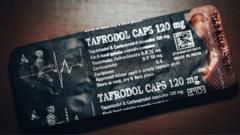India has taken decisive action in response to a growing public health crisis driven by opioids in West Africa. This comes after a BBC investigation revealed that Mumbai-based pharmaceutical company Aveo had been illegally exporting a harmful combination of tapentadol and carisoprodol to countries including Nigeria and Ghana. In a directive from Dr. Rajeev Singh Raghuvanshi, India's Drugs Controller General, the government has immediately banned the manufacture and export of these highly addictive substances.
The investigation revealed the dangerous nature of the drugs, as well as their notoriety as cheap, accessible street drugs in West Africa. Aveo, along with its sister company Westfin International, reportedly shipped millions of pills to the region's vulnerable markets. With about four million Nigerians estimated to misuse opioids, the situation has become critical.
Filming undercover, the BBC documented a meeting in which Aveo’s director, Vinod Sharma, acknowledged the harmfulness of the pills but expressed a willingness to continue supplying them, stating that such practices are simply "business." Following the investigation, Indian authorities raided Aveo’s Mumbai factory, seizing its entire stock and halting further production.
In an effort to combat this public health crisis, India's Food and Drug Administration (FDA) is preparing to take further legal actions against Aveo while pledging to enhance inspections to prevent similar illegal activities in the future. The urgency of this situation reflects a broader global issue as the misuse of prescription opioids continues to wreak havoc, particularly in vulnerable regions where healthcare systems are ill-equipped to deal with the fallout.





















